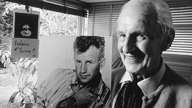Paragraph 175
 USA / 1999 / English, German, French / Color / 35mm (1:1.85) / 81 min
USA / 1999 / English, German, French / Color / 35mm (1:1.85) / 81 min
Directors, Producers: Rob Epstein, Jeffrey Friedman
Script: Sharon Wood
Photography: Bernd Meiners
Editing: Dawn Logsdon
Sound: Pascal Capitalia
Music: Tibor Szemzö
Narrator: Rupert Everett
Director of Research, Associate Producer: Klaus Muller
Producers: Janet Cole, Michael Ehrenzweig
Co-Producer: Howard Rosenman Production Company, Source: Telling Pictures
World Sales: Films Transit International
402 East Notre-Dame, Montréal QC H2Y 1C8 CANADA
Phone: 1-514-844-3358 Fax: 1-514-844-7298 E-mail: info@filmtransit.com
Until now, the fact that the Nazi’s campaign of persecution touched not only Jews but also homosexuals has gone all but unknown. This film unearths this long-hidden history through the stories of gay men and one lesbian who felt first-hand the tyranny of German criminal law’s “Paragraph 175.” Heinz speaks about his time in concentration camps, Frenchman Pierre witnesses the slaughter of his boyfriend, and Jewish Gad recalls his experiences as the leader of an underground resistance movement.
[Director’s Statement] According to a 1993 survey commissioned by the American Jewish Committee, only about half of the adults in Britain and a mere quarter of those in the U.S. knew that gays were victims of the Nazi regime, let alone that the pink triangle was the physical emblem used by the Nazis to identify homosexual men. Paragraph 175 explores a history that has not been told on film and has hardly been looked at in history books. Why has there been such exclusion in the historical record of the experiences of tens of thousands of people who were persecuted and murdered?
As gay men and as Jews, we had obvious personal reasons to be drawn to this issue. We felt a particular urgency to record what stories we could while there were still living witnesses to tell them. And as filmmakers, we were drawn to the ambiguities of the story. There were homosexual victims, there were homosexual resistance fighters, and there were homosexual Nazis and Nazi sympathizers. And although the Nazis consistently persecuted homosexuals, their opponents repeatedly used the homosexuality of one high-ranking Nazi official to propagandize that all Nazis were homosexual.
During the Nazi era, many gay people escaped persecution. How did they survive? What makes one person a hero and another a villain? And why are so many of us discomforted by the gray areas of human experience?
 Rob Epstein & Jeffrey Friedman
Rob Epstein & Jeffrey Friedman
Collective and individual awards include two Academy Awards, multiple Emmy Awards and three Peabody Awards. Rob won his first Oscar in 1985 for classic documentary The Times of Harvey Milk. In 1987, founded Telling Pictures, through which they produced and directed their first project together, Common Threads: Stories from the Quilt. Common Threads won the Oscar for Best Documentary Feature in 1990. The Celluloid Closet (1995), a Hollywood history, has been seen in theaters and on television around the world. Other films include Where Are We? (Our Trip through America) (1991) and Xtreme: Sports to Die for (1999). |
|
• International Competition | Angelos’ Film | A2 | Buenaventura Durruti, Anarchist | Crazy | Days in Those Mountains | La Devinière | Gaea Girls | Grandma’s Hairpin | In Vanda’s Room | The Land of the Wandering Souls | Mysterious Object at Noon | Paragraph 175 | Private Chronicles. Monologue | 6 Easy Pieces | Southern Comfort • Jurors | Hartmut Bitomsky | Bernard Eisenschitz | Ann Hui | Kuroki Kazuo | Ivars Seleckis |
